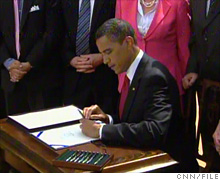Consumers gain clout in Washington
After being on the outside for years, consumer lobbyists have gained power. Credit card rules were just the start of what they hope to do with it.
 |
| Obama signs credit card bill, a big win for consumer advocates. |
WASHINGTON (CNNMoney.com) -- Meet Washington's new power brokers on the economy: Consumer advocates.
They are rubbing shoulders with the president at bill-signing ceremonies and getting face time with economic chief Larry Summers. A few are even returning calls from lawmakers whose offices they used to hound.
After eight years of getting the cold shoulder, consumer groups are relishing their new role in the policy-shaping spotlight. Consumer advocates celebrated their biggest legislative victory in years when President Obama signed the credit card bill.
Now they're gearing up for the next big battle: regulatory reform.
"I assure you that when you see our whole vision of our regulatory reform going forward, consumer protection is not a side issue," said Treasury Secretary counselor Gene Sperling on Thursday during a speech at a conference at the Federal Reserve.
On May 7, Summers invited 15 to 20 advocates to the White House to solicit ideas about reshaping the nation's patchwork regulatory system to prevent future financial collapses, according to four participants.
One group, the New America Foundation, a left-leaning think tank sensitive to consumer causes, has had at least a dozen conversations with top White House officials in person and over the phone, according to policy director Ellen Seidman.
Pam Banks, policy counsel for Consumers Union, has seen the inside of both the White House and the Treasury Department in the last several weeks.
"I can say for a long time, there were few consumer groups that had seen the inside of the White House or the Treasury," said Banks. "Now sometimes you go to these meetings, and they say: Tell us what's on your mind. And then they start taking notes."
Political experts say the ascendancy of consumer activists should come as no surprise; President Obama, during his campaign, pledged to tap them. In addition, he spent his early years working as a community organizer on Chicago's South Side and worked with advocacy groups as an attorney.
But the swift consumer victory on credit cards caused the financial sector lobby -- and even a few consumer advocates -- to do a double take.
Several tough provisions attacking credit card practices, such as allowing consumers to fall two months behind on a bill before seeing a rate hike, made it into the final bill. And that happened despite heavy lobbying by the banking industry to block such provisions.
Consumer advocates say the Senate, in particular, is a tough sell for them, even though the Democrats currently have control of 59 seats. But having President Obama on board "gave us the extra push," said Ed Mierzwinski, a 20-year veteran consumer advocate for National Association of State Public Interest Research Groups.
Of course, the financial sector has hardly lost its grip in Washington. In the same weeks that credit card legislation was advancing, financial sector lobbyists fended off a provision in the Senate that would have allowed bankruptcy judges to modify underwater mortgages. And they, too, have been visiting with top White House officials.
The financial sector is not intimidated by consumer advocates, said Scott Talbott of the Financial Services Roundtable, which represents the largest financial services companies. But companies recognize that the stars have aligned to give consumer advocates a bigger, more visible stage.
"With Democrats in control and the wave of populism that has swept through, consumer protections are on everybody's tongue," Talbott said.
One area of regulatory reform that consumer advocates are particularly keen on is a new panel that would regulate mortgages and credit cards. The White House supports the idea of creating a so-called Financial Safety Products Commission, say consumer advocates and legislative aides.
"These are ideas that are not new to us, but haven't been vogue in Washington and they're getting more credence," said Caleb Gibson of the liberal think tank Demos, which has been working on the blueprint for such a commission.
Consumer groups want a strong and independent agency that publicly monitors mortgages and credit cards in a transparent way. But they don't want it to preempt strong consumer laws already in place in some states and localities.
The idea was one that caught the president's attention months ago. While appearing on Jay Leno's "The Tonight Show" in March, Obama used one of the arguments used by proponents.
"When you buy a toaster, if it explodes in your face, there's a law that says, you know, your toasters need to be safe," he said. "When you get a credit card or you get a mortgage, there's no law on the books that says, if that explodes in your face, financially, somehow you're going to be protected."
Consumer advocates say the president embraces consumer protection issues, often far ahead of his own advisers and lawmakers.
"This president gets it on our issues," Mierzwinski said. "And that's great for us." ![]()


